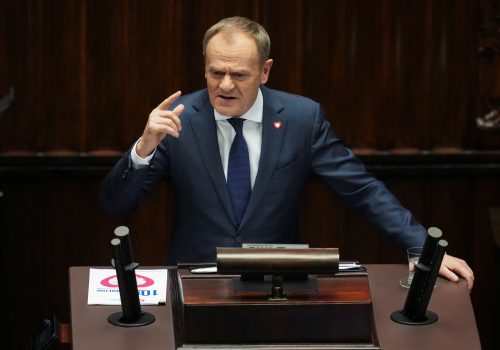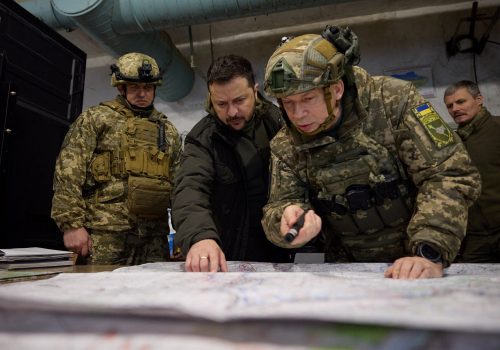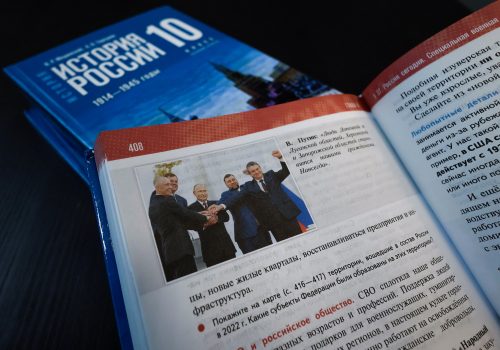Zelenskyy visits DC at Ukraine’s most dangerous moment
JUST IN
Sometimes politics doesn’t end at the water’s edge. Amid a difficult stage in Ukraine’s fight against Russia’s invasion and congressional division over US policy toward Kyiv, Ukrainian President Volodymyr Zelenskyy is visiting Washington this week to make his case for continued aid for his country. While US President Joe Biden said Tuesday he “will not walk away” from Ukraine, Zelenskyy got a more mixed reception on Capitol Hill, where Ukraine funding has been held up amid fights over a broader spending package. Zelenskyy said his meetings in Congress “were more than positive, but we know that we have to separate words and particular results.” Below, our experts analyze the visit and what results to expect next.
TODAY’S EXPERT REACTION COURTESY OF
- John. E. Herbst (@JohnEdHerbst) Senior director of the Atlantic Council’s Eurasia Center and former US ambassador to Ukraine
- Shelby Magid (@shelbyjmag) Deputy director of the Eurasia Center
- Daniel Fried (@AmbDanFried) Weiser family distinguished fellow and former US assistant secretary of state for Europe
What’s at stake
- “We are now at the most dangerous moment in Russia’s nearly ten-year war of aggression in Europe,” with US support for Ukraine in doubt, says John, who met with Zelenskyy and others on Monday night. He added that if the United States cut off aid to Ukraine and Europe were to follow suit, “Ukraine may well be defeated by Russian forces: a disaster for Ukraine and a strategic defeat for the United States, which will have to spend much more to defend against Russian aggression—at the possible cost of American lives.”
- The implications for the funding battle go beyond Ukraine, says Shelby. It will demonstrate whether Congress “is still committed to the US role in leading the free world against authoritarianism” and can stand by US national security commitments.
- The decision on aid will also have immediate implications for Ukraine heading into the winter, says Shelby, when “Russia is likely to escalate its campaign of attacks against critical infrastructure and civilians,” just as Ukraine is running low on US-supplied munitions and air defenses.
Subscribe to Fast Thinking email alerts
Sign up to receive rapid insight in your inbox from Atlantic Council experts on global events as they unfold.

Congressional deadlock
- While Biden announced another $200 million in military aid for Ukraine, coffers are running low, with all eyes on Capitol Hill. Key members of Congress are still trying to hammer out an agreement linking further financial assistance to Kyiv to US border security and immigration policy changes, as part of a broader bill.
- “Ukraine aid has been dangerously tied to policy on the US border and is now caught in domestic debates unrelated to the war,” says Shelby. “It doesn’t seem that Zelenskyy changed this entrenched dynamic with his visit, and he smartly avoided addressing the border head-on. It is on congressional leaders and the White House to figure out a way out of this mess—and soon.”
- Zelenskyy understood the delicate nature of the congressional negotiation, says John, which is why he studiously avoided anything that could be perceived as partisan. “He made his case as to why American assistance is essential to prevent a potential genocide in Ukraine, but also to ensure vital American interests.”
- Meanwhile, congressional deadlock over Ukraine aid is being celebrated in Moscow, from the Kremlin to Russian state TV says Shelby. “With their joy, it is clear a delayed vote and prevention of immediate significant new aid to Ukraine is seen as a victory in the Kremlin’s eyes.”
Strategic thinking
- Besides further aid, Dan tells us that Zelenskyy’s visit to Washington offered a chance for “strategic consultations on the way ahead” in the war, as “high hopes” for this year’s Ukrainian counteroffensive “have not been realized.”
- As part of his efforts to gird his country for the long haul, Zelenskyy also noted during a White House press conference that he met with US defense industry leaders. “His remarks about creating jobs in the US were made with Congress in mind,” Dan tells us, “because, indeed, much of the US military assistance to Ukraine goes to US arms manufacturers that build weapons and munitions Ukraine needs.”
- Since a “rapid and satisfying” Ukrainian victory now seems unlikely, the question now is what long-term strategy will achieve the best possible outcome for Ukraine, Europe, and the United States, Dan says.
- While Zelenskyy probably got the assurances he wanted from Biden, the US president “likely wanted to hear how Zelenskyy is thinking of the way ahead given the tougher circumstances,” Dan adds. Zelenskyy “might have wisely chosen to keep such discussions with the US out of the public eye for now.”
Further reading
Tue, Dec 12, 2023
New Polish PM Donald Tusk vows “full mobilization” of West to help Ukraine
UkraineAlert By Peter Dickinson
Poland’s newly appointed Prime Minister Donald Tusk has vowed to rally Western support for Ukraine as it continues to defend itself against Russia’s ongoing invasion, writes Peter Dickinson.
Fri, Dec 1, 2023
Don’t stop now. US aid to Ukraine continues to be a wise investment.
New Atlanticist By Michael John Williams
Cutting off aid to Ukraine now, as some in Congress propose, would undermine the immediate war effort in Europe and diminish the deterrent power of US military force globally.
Tue, Dec 5, 2023
Fake history is a crucial weapon in Vladimir Putin’s bid to destroy Ukraine
UkraineAlert By
The invading Russian army is not the only enemy Ukraine faces; the Kremlin propaganda and false historical narratives that drive and justify the invasion are arguably just as deadly, writes Ihor Smeshko.
Image: Ukrainian President Volodymyr Zelenskyy walks into the West Wing ahead of a meeting with U.S. President Joe Biden at the White House on December 12, 2023 in Washington, D.C. Zelenskyy is meeting with officials in the United States to ask for continued military support in their fight against the Russian invaders. (Photo by Samuel Corum/Sipa USA)


